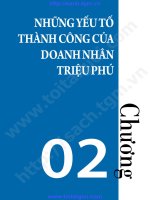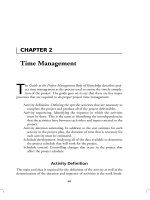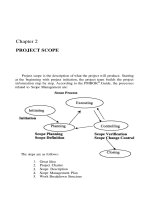Crisis intervention strategies chapter 2
Bạn đang xem bản rút gọn của tài liệu. Xem và tải ngay bản đầy đủ của tài liệu tại đây (200.04 KB, 18 trang )
Chapter 2 – Culturally Effective Helping
1
4 ATTRIBUTES FOR CRISIS WORKERS
•
•
•
•
Self knowledge and awareness of biases
Knowledge about the status and cultures of
different groups
Culturally appropriate skills and interventions
Multicultural experience
2
NON-WESTERN PERSPECTIVE
•
•
•
•
Majority of the world population
Historical field of counseling (western)
May impact our interpretations, judgments
and conclusions
Can cause harm
3
10 BIASED ASSUMPTIONS
1.
2.
3.
4.
5.
“Normal” is the same for everyone.
Individualism is basic for all.
“Counseling” is well defined and
separate.
Abstract words are understood
Independence is valued more than
dependence
4
10 BIASED ASSUMPTIONS (CONT.)
Formal counseling is valued over natural support
systems
7. Everyone depends on linear thinking (cause and
effect), good/bad, right/wrong
8. Change individual to fit the system
9. Crisis is here and now (downplaying value of the past)
10. Counselors are aware of assumptions
6.
5
FOCUSED VIEW
•
•
Visible and racial ethnic minorities
“may be asking for trouble”
6
UNIVERSAL VIEW
•
•
•
•
•
Not only racial and ethnic minorities
Also other minority or special populations
All factors that make clients ‘different’
“Cultural Influences”
Multiculturalism does not always ‘stand out’
7
WHAT WE ‘DO’ KNOW
•
•
Beliefs and ways of coping surface when in
crisis
Minorities access counseling less than
Caucasians when in crisis (although
impacted with disaster more often)
8
COUNSELOR DANGEROUS ASSUMPTIONS BASED ON 5
CORE BELIEF DOMAINS (THEY DON'T UNDERSTAND)
•
•
•
•
•
Superiority
Injustice
Vulnerability
Distrust
Helplessness
9
DEEPLY ENTRENCHED PATTERNS
•
•
Impact emotions and behaviors
Can lead to conflicts and crisis
10
PAST HISTORY AND EXPERIENCE
•
Can impact client view of crisis intervention
services
11
EFFECTIVE MULTICULTURAL COUNSELOR
•
•
•
•
•
“Humans are more alike than different”
World view should not be overlooked
Other helping roles may be needed
Indigenous support system may be needed
Proper use of translators
12
INEFFECTIVE MULTICULTURAL
COUNSELOR
•
•
•
Imposes own values and expectations
Stereotype or labeling
Force unimodal counseling approaches
•
Ex:
•
•
•
verbalizing feelings,
speaking up,
status related flow of communication
13
IMPORTANT TERMS
•
•
•
•
Individualism
Collectivism
High Context
Low Context
14
ECOLOGICAL FACTORS
•
•
•
•
•
•
•
•
•
•
•
Family
Race
Religion
Locale
Physical ability
Sex/gender
Economic class
Vocation
Physical needs
Social affiliations
Etc.
•Impacts the counselor
•Impacts the client
15
LOCUS OF CONTROL
•
•
Internal
External
•
•
Powerful Others
Especially in Crisis
16
OTHER ISSUES
•
•
•
•
•
•
•
Turf
Generational differences
Confidentiality/green cards
Loss of face
Too much help
Occupational cultures
Seeking community representatives
17
YAVIS
•
•
•
•
•
Young
Attractive
Verbal
Intelligent
Socially well-connected
18









